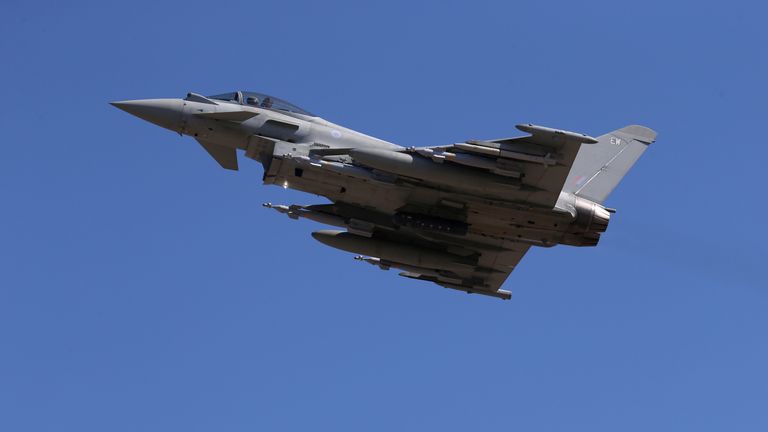RAF to 'protect and defend' UK space assets
The defence secretary says the government is looking at potential risks including a deliberate attack by another state.
Monday 21 May 2018 17:50, UK
Space isn't just about what happens up there, near the stars - it is about what happens down here, on the ground.
Like cyber, we've all become entirely reliant on it without really realising.
Mobile phones, navigation, weather forecasts, you name it; the life-enhancing technology that we all now take for granted is only possible because of a network of satellites orbiting the earth.
This technology is vital to military operations too - fighter jets, helicopters, missiles, communications all depend on it.
Without it, or if it was compromised in a cyber attack, the British armed forces would be pretty much useless.
At the UK's first defence-space conference, the defence minister announced plans to give the RAF command and control of the UK's space operations:
"We are now treating space as a key operational domain," Gavin Williamson an industry audience in London.
"We're working to fully understand the risks from accidents and natural hazards in space to a deliberate attack by organised groups or another state.
"We're ready, and prepared, to protect and defend our space assets and infrastructure, alongside our allies and partners."
China has developed and tested a satellite-killing missile.
Many states now have the cyber know-how that gives them the potential to hack into systems and disable them.
The more integrated satellite technology becomes in national infrastructure, and it is already pretty crucial, the more of a target it becomes for adversaries.
All the more important then, that the systems are secure and strangely, given its tendency to lead the way in the things, the US GPS system is vulnerable.
To that end, the EU is developing its own satellite system - Galileo.
The UK has had a pivotal role in this, providing expertise particularly in satellite production.
But when the UK leaves the EU, it will no longer have automatic access to the more sensitive parts of the system and that has angered Downing Street.
In response, the UK has threatened to withdraw from Galileo.
That will put the programme back a few years, but will also mean the UK will need to develop its own system, costing billions of pounds the UK can barely afford.
Another option would be to join up with allies such as Australia, Canada or Japan.
In the past, the military led the way in developing these systems - GPS is a perfect example, it is still owned and controlled by the US military but sits on most car dashboards in the form of sat nav, as just one example.
Commercial rivals are today overtaking military in the development of new systems and that poses its own challenge for governments.
At its most complex, the row over Galileo is dense science, and nuanced politics. It has become another Brexit tug-of-war.
But at its most simple it is about money, jobs, national security and our basic ability to use everyday technology that depends on satellites - that's why it's a disagreement that must be resolved in the UK's favour, and the EU knows that.





